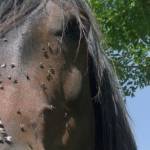Fighting Allergies in Horses: Therapeutic Proteins

Horses suffer allergies from a variety of environmental agents, such as dust, molds, and pollens; insect bites (Culicoides or biting midges); topical products such as shampoos and insect repellents; medications such as procaine penicillin; and some types of feeds or nutritional supplements.
Signs of allergic reactions can vary markedly from hives, itchiness and wheezing to a full-blown, life-threatening allergic reaction. All of these signs occur as a result of the immune system overreacting to a harmless stimulus.
Treatments vary depending on the underlying cause, severity, and owner preference. The most popular option is to avoid the trigger, which in most cases is easier said than done. In some instances, this involves allergy shots, a type of immunotherapy designed to decrease the body’s sensitivity to a particular allergen.
“Another option is to use natural anti-inflammatory products such as a marine-derived fish oil supplements. Kentucky Equine Research (KER) offers EO•3, a palatable oil that contains the omega-3 fatty acids DHA and EPA and is top-dressed onto the feed,” advised Kathleen Crandell, Ph.D., a nutritionist for KER.
To deter biting midges, horsemen typically rely on topical insect repellents, fine mesh placed strategically around certain stalls, and fans. A group of researchers from Iceland* recently tested a more novel method of reducing allergic sensitivity.
The researchers identified a protein in the saliva of the biting midge that causes an allergic reaction in horses and then used barley plants to produce that protein. They hypothesized this unique form of barley—referred to as a “therapeutic protein”—may provide an alternative treatment option for insect bite hypersensitivity in horses. Preliminary results are promising, and additional studies are underway.
*Jonsdottir, S., V. Svansson, S.B. Stefansdottir, et al. Oral administration of transgenic barley expressing a Culicoides allergen induces specific antibody response. Equine Veterinary Journal. In press.








